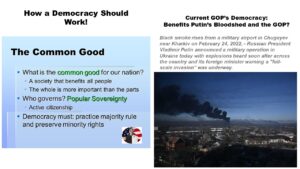Trump is America’s most immediate threat to democracy’s dissolution. His violent rhetoric poses a looming peril to humanity. Like Hitler before him, whom he mimics in his populist rallies, hateful vitriol pours forth to poison mind and soul. If we survive this onslaught of hate and revenge from this malevolent threat, the real perps will still be behind the scenes in their corporate C-suites. Most are untaxed oligarchs who use our taxes, data, and attention to acquire even more riches. Self-profit agents will still be their visible front while they cavort in their yachts, private jets, and space vehicles.
It is the corporate elite who have set the fascist table for Trump, but even with his hopeful defeat, they will still have the infrastructure they built for the next con man to lead us to self-destruction. In the corporate elite bag of tricks, a violent coup is still the very last resort. More likely, the corporate elite will remain in the shadows behind the next emerged con man.
The corporate plan, carried out by mostly paid GOP agents is threefold. First, weaken democracy in all ways possible like gerrymandering, suppression of the vote, bending rules, and giving money the vote; second, to retain the division, the polarization with the radical for-profit news network that supports it daily; and third, to perpetuate the causes for inequality and dissatifaction among many Americans. The second will make enough vulnerable voters either not vote or vote with the venom, anger, and vitriol fed to them by sources like Fox News, which, in effect, Spews GOP venom 24/7.
The sole purpose of business corporations, now omnipresent-people under a SCOTUS ruling, is to make a profit. They thrive under the form of a capitalist economy, hosted in a democracy, even modified in a command economy like China, where the profit helps the leader maintain his hold on power. In a democracy like our own, it exists solely for profit, while American democracy ideally exists to represent the people.
Due to business’ sole purpose of making a profit, its pillars of power have become modern followers of the Machiavellian philosophy, named after its proposer, Niccolo di Bernardo dei Machiavelli who lived in 15th and 16th century Italy.
The Machiavellian perspective came from the sneaky, cunning and amoral codes of autocratic leaders in Italy. Its current corporate advocates adopt similar codes. Today’s democracies rule for the people (we hope); corporations, for profit. Too often, in effect, this distills into “The end justifies the means,” in “board room” policy. In a global corporate setting, any concern for democracy is secondary.
For businesses, end goals must supercede the welfare of the people, so the means for achieving profit have little to do with fostering or promoting democracy. Especially in modern times that involves conditioning the people for the corporate agenda.
To accomplish this, business’s soft coup had to modify media philosophy and structure, using government and sidearming its democratic purpose. The first goal was to eliminate the fairness doctrine, a sort of public information equality, which eliminated bias mostly in the news. This was done through administrative power during the Reagan Administration in 1987 when his FCC abolished requirements for a balanced news reporting on the three main networks.
Corporations then worked to consolidate communication into huge corporate ownerships, now called mass media which was composed of broadcast (television, radio, & films) and digital (internet and mobile). Media mergers put them into the hands of a few, principally boiled down to six: Comcast, Walt Disney, AT&T, Paramount Global, Sony, and Fox. For-profit replaced fairness and balance as the sole motive.
Furthermore, social media’s entry in the corporate picture assured that profit would dictate media content for all users. By 2023, social media users numbered around 5 billion out of a global population of 8.1 billion. Composition of users follow the 90-9-1 rule, 90% lurkers who never contribute, 9% contribute very little, and 1% dominate. Content providers are companies that advertise, sell products offer games, news and information.
Basically, political parties dominate persuasive content, now mostly through digital tools. The potential for molding the minds of users is thus in the hands of a few owners, providers, and users. The few owners see profit in the more volatile content of their right-wing users, where deep pockets push political content, a good portion coming from foreign pockets.
Social media tools to handle this number of users goes to social media algorithms not people. It is a complex set of rules and calculations platforms use to prioritize the content that users see in their feeds. It takes into account the past behavior, content relevance and the popularity of posts. The motive, of course, is profit and profit resides in the volume of traffic you can engineer.
Most spokesmen for the largest social media companies like Meta and Twitter (X) tend to admit bias in algorithms is toward rightwing politicians and news outlets. Its flashpoint vitriol seems to draw more users and thus more profit. Regulation of such digital platforms by governments is minimal.
Business enterprise was always the linchpin of a thriving American republic. It was always central in the tide of American development and was always the mold and form that American culture took. Thus, you should not underestimate its overswaying power and influence.
In the case of America’s experiment in democracy, perhaps business enterprise was more predisposed by inclination and cultural background to be more focused on controlling profit than pleasing consumers, or in a representative government.
And perhaps initially the American dream that nourished democracy came through opportunity wrought by plentiful land and resources, and when both were depleted the dream slowly began to fade. Two and a half centuries is a long time for that experiment in democracy, especially when its not number one in your priorities.
For the South, the economy was “King Cotton.” And just before the Civil War, northern political campaign speeches were about “Slave Oligarchy,” and post-war reconstruction attempted to break these structures of oligarchy.
Near the end of the next century, oligarchy changed forms just after America’s declared victory in the Cold War.
Berezovsky, a new breed of Russian businessmen, gathered and built the spoils of a broken Soviet Union into huge forturnes. He and his Russian business allies made a deal with President Boris Yeltsin to privatize the former Soviet state and became major owners of Russia’s wealth.
They became the brains and power behind Yeltsin’s new “corporate government,” and in the early 1990s, America’s lawyers, bankers and academics helped to mold the post-Soviet landscape into an American image. More evident in that grasp for money and power was the amoral Donald Trump who courted Russian oligarchs for their laundered funds.
Throughout America’s history, we have had our share of detours toward fascism and only minor left turns, but it is quite evident, that is, if you look at the principle funders of Republicans, that corporate business interests built the last offramp leading to Trump.
The question still remains if, Trump, a two-times-impeached president and three-times indicted felon, will prevail in the next election to return for a second term, fulfilling a fascist leadership which he himself publically promises. Polls say he has an even chance.
Now as the real story of American history will tell you, democracy is not uravelling because of one totally corrupt, self-serving man. Long before Donald Trump came along, democratic updates were shunned, right-wing flareups threatened it, and the elite of business were always there to keep it working for them. Half a century ago capitalist forces, much like a shadow government, instituted a plan to regain firm control.
After Viet Nam War protests and an egalitarian surge in democracy, America’s business elite sounded the alarm and secured a plan to to take control of America, gradually selecting the Republican Party leadership as their agents and fashioning an infrastructure friendly to their cause. Their efforts set up the preconditions for a plutocracy, utilizing a ruthless, but peaceful plan of control for essential institutions in government, the economy, media, and education.
Without grasping the tentacles of control, like the news media, government, the economy, public perception, and even tweaking the vote, there was no hope of gaining citizen votes needed, especially with ethnic changes in the population.
Amorphous shadows in the background, by the 21rst century, corporations were engineering record profits. Billionaires were proliferating, at the expense of millions shutout from the American dream. the largesse of fat profits increased, helping to easily finance the change, including control of media, the economy, appointment of friendly judges, subjugation of labor unions – it was all there when Trump stepped into the scene.
His acceptance by voters in spite of his malice and racism was a surprise. Many Americans had been forgotten and abused by the ruling elite who had no ears for their struggles and anguish. GOP Leaders bought with corporate money became sole advocates for the corporate agenda: including shutting out access to unions, export of jobs, ruptured access to health care, an economy that forgot the vulnerable, a dearth of family care, privatization of public services and tax cuts for the rich.
In essence, the American Dream, upward social mobility for yourself and your children, is openly mocked by media imagery. Two economic tiers, one, with images of the idle rich, billionaires gamboling on giant, sumptuous, yachts, foraging into space, and boarding private jets, all leaving streams of effluents; ours, the other, too mundane for media imagery, a daily struggle for any traction toward that good life. Perhaps openly citing the cause of inequality, Jeff Bezos, billionaire Amazon founder, after his somewhat rebuked spaceflight said, ‘You guys paid for all of this.”
We can think of the overall voyaging backdrop as a giant ship on a solitary pitching sea, being steered by two captains: one answering only to a madman filled with nihilistic negativity, shouting vicious lies to the passengers, a minority emotionally reacting, red-faced and angry, shouting back, while full of induced revenge; the other captain, full of decorum, trying to keep the ship afloat, and barely kept order, interupted by mass shootings, among the majority of passengers.
This contrast brings us to not one but two other similar scenes, cruel and total destruction by starkly senseless wars wrought by perhaps 3 self-serving lunatics vying for power.
Back to the giant ship: an insurrectionist, a felon, a sued sex offender, a habitual liar, a conman, a cheat and a fraud is the one shouting orders to one captain and inciting anger and revenge in its passengers. The other captain is Joe Biden, our president.
Over decades, Joe Biden had resolved that the forgotten must be brought back into the fold of prosperity. Unfortunately, Biden’s fervor in getting it done didn’t come until 2023 after 50 years of corporate suppression of wage increases: from the 1980s on the economy’s output grew enormously; output per worker grew 126 percent while wages increased only 27 percent.
It has been a lot to bear by the working class. No wonder their concept of the American Dream has been crushed when a majority of Americans today are more pressured to get life’s necessities, more unsure of their future and less able to find avenues in getting ahead. Is it any wonder they’re fed up with politics as usual, think the system is rigged (catchwords of Donald Trump), and seek a populist to make things more secure.
In a thriving economy and with advances in employment and income, Biden’s improvements seem too late and too unrecognized, most especially by the corporate media, which thrives on division and rancor coming from Republican leaders rather than the more cheery news of rising wages, and reduced inflation.
If Democrats win another term and can take control of both Houses of Congress and the Presidency after 2024, they may be able to turn the corner of despair felt by too many voters by continuing in the direction of a F. D.R. type of government support for the common good. If Republicans win control of even one house, the government paralysis will continue and feckless Republicans will continue the misrule while pushing tax cuts for the rich, something they do best.




